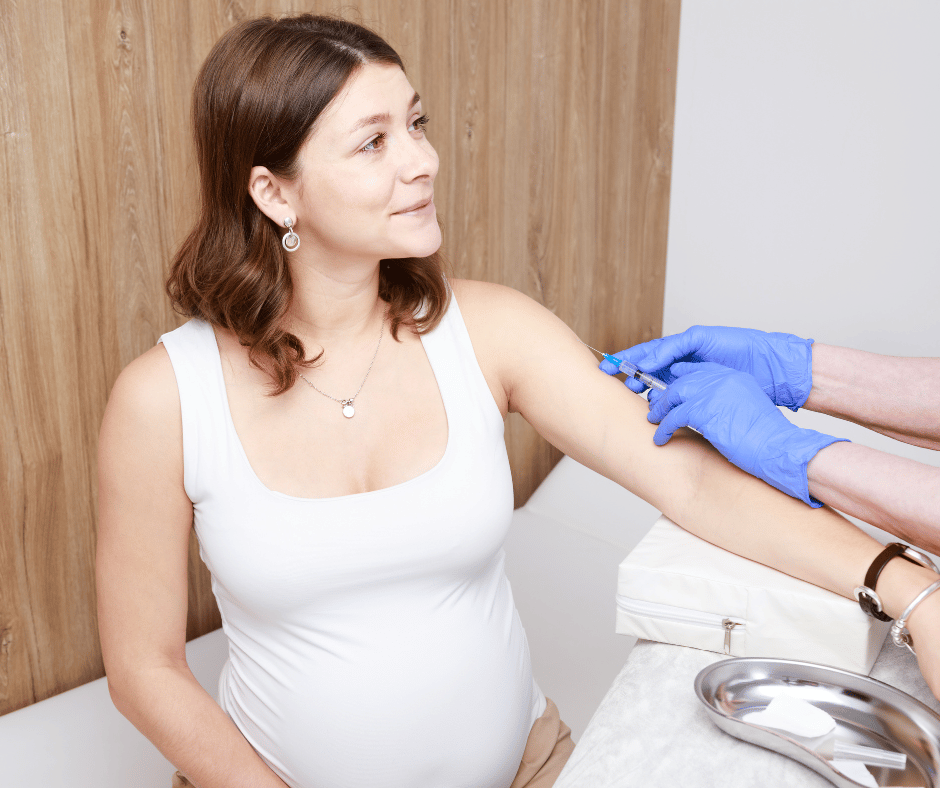Congrats! You’ve made it through the first trimester of pregnancy and are probably wondering about what your OBGYN will do throughout the rest of your pregnancy to help you and your baby be as healthy as possible. One thing your OB will do is review your vaccination record, to make sure you are up to date. If you haven’t received Meningococcal, Pneumococcal, Hepatitis A or Hepatitis B vaccines, your OB should try to get you caught up on those vaccinations. An influenza vaccine should be given during pregnancy as well, and may be given during any trimester.

*** Every pregnant woman should receive a Tdap (Tetanus Toxoid, reduced diphtheria toxoid, and acellular pertussis) vaccine as early in the 3rd trimester as possible. ***
Vaccines during pregnancy help protect your baby by transferring protective antibodies across the placenta that help babies have immunity to vaccine-preventable diseases until they are able to receive vaccines at 2 months old.
Tdap – Babies from mothers who do not receive the Tdap vaccine during pregnancy are at a significantly higher risk of contracting pertussis in their first two months of life. If a newborn contracts pertussis, otherwise known as whooping cough, they are almost always hospitalized for difficulty breathing, and often end up in the Pediatric ICU. The scary part about pertussis is that it can be caught from anyone unknowingly, as it appears to be a “cold” or “allergies” in an unsuspecting adult. Pertussis is unfortunately common again after being significantly suppressed with vaccines for years.
Tetanus and Diphtheria are less common, but important to provide protection against.
Influenza – A pregnant woman who catches influenza (flu) is at a higher risk of developing pneumonia and severe illness, often requiring hospitalization and at increased risk of being admitted to the Intensive Care Unit. Even women who are thinking about getting pregnant should make sure they are up to date on their annual flu vaccine. It is also recommended that anyone who will be around the pregnant woman, or around the newborn baby, have their flu shot up to date as well.
The American College of Gynecology is recommending that all eligible persons aged 6 months or older, including pregnant and lactating individuals, receive a COVID-19 vaccine or vaccine series. mRNA and Novavax vaccines are preferred over J&J/Janssen COVID-19 Vaccine. According to multiple studies listed by ACOG, there is no evidence of adverse maternal or fetal effects from vaccinating pregnant individuals with COVID-19 vaccines. There is data starting to come out that vaccine-induced antibodies cross the placenta, but unsure to what extent. There are emerging studies about lactation as well, that are showing that antibodies from the mRNA COVID-19 vaccine are passing through breastmilk, suggesting that the infant may have some degree of protection from the mother/lactating person receiving the vaccine. If you are unsure about the COVID-19 vaccine, please discuss how you feel about it with your OBGYN.
In addition to pregnant women receiving their Tdap and Flu vaccines, it is highly recommended that their partner and any other individuals who will be around the pregnant woman and/or newborn baby be up to date on their Tdap (within 10 years) and have their annual flu vaccine.
As Mama Coaches, we are here to be supportive to you and your family. We will gladly have non-judgemental and evidence-based conversations with you about vaccines and answer any questions you may have. Our goal is to make parenthood easier.
